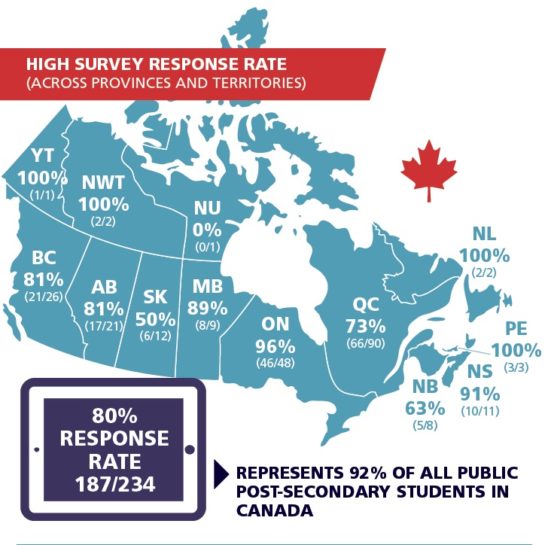The Canadian Digital Learning Research Association has just finalised the results from the 2018 national survey. The full technical report has been completed in English and is being translated into French. A shorter, more concise public report is currently being prepared. These reports will be published on January 11.
The main results have been summarised in the following anglophone and francophone infographics designed by eCampus Ontario, one of the main sponsors of the survey.
Although the infographic looks great printed, it is more difficult to squeeze it into a web page, so for those with eyesight like mine, here are the same results verbally (media redundancy is good for learning):
- 80% institutional response rate representing 92% of all Canadian post-secondary students
- more than two-thirds of all Canadian public universities and colleges offer online courses for credit, and almost all universities, and almost all colleges outside Québec
- in 2018, there were more than 1.3 million online course registrations, representing 8% of all course registrations
- roughly one in five Canadian students are taking at least one online course for credit
- 74% of institutions expect online enrolments to increase in 2018-2019
- nearly all institutions use a learning management system and two-thirds use streamed video and/or live video lectures
- 53% of institutions are using open textbooks
- just over two-thirds reported that online learning was very or extremely important for their strategic or academic plan
- just under a third were developing an e-learning plan
- nearly all institutions reported that the main benefit of online learning was increased student access
- the main barriers to online learning were increased time for faculty/instructors and inadequate training and support
- nearly all institutions rated blended learning, and 87% of institutions rated online learning, as equal or superior to face-to-face teaching.
All public post-secondary institutions in Canada will receive information on how to access the reports in mid-January. The reports will also be available then from the survey websites as follows:
- English: https://onlinelearningsurveycanada.ca/
- French: https://formationenlignecanada.ca/
The survey is planned to be repeated in 2019, with data collection beginning in April.
As a member of the CDLRA team, I would like to thank sincerely all those who toiled to provide such excellent data for the 2018 survey. The result has been comprehensive and reliable data on online learning in Canada. Thank you so much – you have definitely earned your holiday break!












 Dr. Tony Bates is the author of eleven books in the field of online learning and distance education. He has provided consulting services specializing in training in the planning and management of online learning and distance education, working with over 40 organizations in 25 countries. Tony is a Research Associate with Contact North | Contact Nord, Ontario’s Distance Education & Training Network.
Dr. Tony Bates is the author of eleven books in the field of online learning and distance education. He has provided consulting services specializing in training in the planning and management of online learning and distance education, working with over 40 organizations in 25 countries. Tony is a Research Associate with Contact North | Contact Nord, Ontario’s Distance Education & Training Network.


This is really interesting data. As an educator who is just completing a Masters of Education and looking to dive further into online learning, this kind of data will be really helpful. And I’m writing a paper about it.